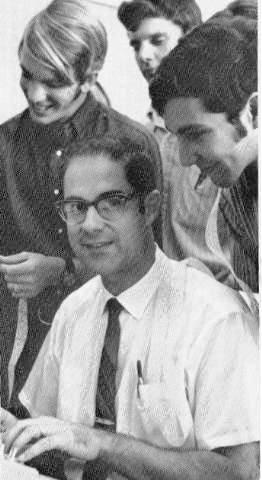
Mr. Paul Foerster
Math Department
Algebra, Calculus, Trigonometry
Mu Alpha Theta Sponsor

 |
Mr. Paul Foerster Math Department Algebra, Calculus, Trigonometry |
 |
|
 |
Mr. Foerster retired from Alamo Heights High School in 2011 after a 40 year teaching career.
Paul Adolph Foerster B.S. Chemical Engineering, University of Texas, Trinity University, Agricultural and Mechanical College of Texas, Oak Ridge School of Reacter Technology. Masters Degree in Mathematics |
Most influential teacher: Mr. Paul Adolph Foerster, who did not teach me to love math, but from whom I learned to love math, and from whom I also learned how to teach. I don't believe that people should change something about themselves for no better reason than that someone else wants them to. However, we sometimes choose to make a change in ourselves because of what we see in someone else. In this context, exactly four persons come to my mind. Because of my knowing these four and seeing something about them that I admired, I chose to make changes in myself. Mr. Foerster was the first of the four; my wife is the fourth. ~ Charlie Beck, 2001 I have been reading in the newspaper this week all about Mr. Foerster’s retirement and having my own fond memories. He was the most “fair” teacher, the most hopeful for his students. I remember he let us keep taking quizzes until we passed. Who does that? I
had Mr. Foerster for Trigonometry ……. maybe the best teacher ever
……. very creative lesson plans and teaching techniques…..
Definitely outside the box…… made math real world…. almost
inspired me to become an engineer…… instead I became a pilot. Deborah
Williams selected Mr. Foerster as her favorite because
"He was able to relate algebra to the real world and to me."
"Because of the help he gave me," was the reason Bob Johnson
gave for selecting the trig teacher. Charles Beck, Robert Comer,
Polly McClanahan, David Ramos, Richard Woolley and Terry
Wang were others who selected Mr. Foerster as their favorite member
of the faculty. Debbie Hendrick summed it up as she wrote,
"He is a good teacher." As a teacher, Paul drew upon his engineering experience to write for his students problems in which functions are used as mathematical models of phenomena in the real world. These problems allowed students to experience the fact that variables really vary, taking on different values in different parts of the problem, an important concept in the preparation for calculus. He compiled these problems into text form so that he would not have to run off all those handouts each year. The materials have a credibility that can come only from being written while on the job, getting immediate feedback from students. Although Paul is most comfortable in the classroom with his own students, he shares what he has learned via presentations each year at local, regional, and national meetings for high school teachers and students. He was his state's recipient of the Presidential Award for Excellence in Mathematics Teaching in 1983, the first year of the award.
|